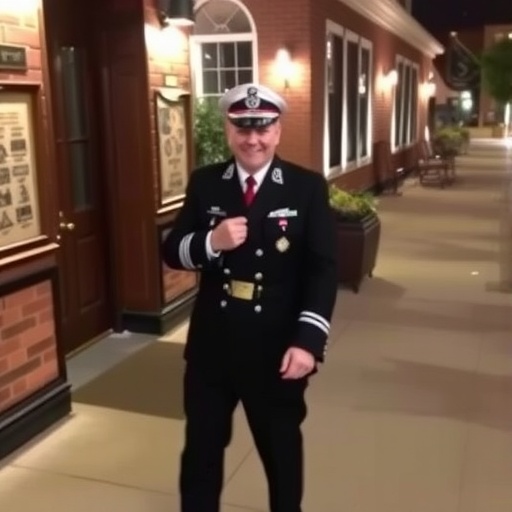Viral Video Captures Man in Nazi Costume Outside Georgia Bar, Sparking Intense Halloween Outrage
In a shocking display that has divided opinions across social media, a man dressed as a Nazi Gestapo officer was filmed parading outside a bustling bar in Athens, Georgia, on Halloween night, igniting widespread public outrage and reigniting debates about the limits of festive expression. The viral video, which has amassed over 500,000 views in less than 48 hours, shows the individual in full regalia—complete with a black uniform, peaked cap, and armband—laughing and posing provocatively as passersby react with visible discomfort and anger.
- Shocking Encounter at Athens’ Heartbeat Bar Ignites Immediate Backlash
- Social Media Storm: How the Viral Video Fueled Nationwide Public Outrage
- Historical Shadows: Why Nazi Costumes Continue to Provoke in Modern America
- Local Leaders and Bar Owners Grapple with Fallout from the Georgia Incident
- Looking Ahead: Redefining Halloween Norms Amid Rising Sensitivities in Georgia and Beyond
The incident unfolded around 10 p.m. on October 31 at a popular downtown spot known for its lively Halloween crowds, turning what should have been a night of harmless fun into a flashpoint for discussions on sensitivity, history, and free speech. Eyewitnesses described the scene as “chilling,” with one local resident tweeting, “This isn’t a costume; it’s a slap in the face to survivors of the Holocaust.” As the clip spreads like wildfire online, authorities in Georgia are now fielding complaints, and community leaders are calling for clearer guidelines on offensive attire during holiday celebrations.
Shocking Encounter at Athens’ Heartbeat Bar Ignites Immediate Backlash
Athens, Georgia—a vibrant college town home to the University of Georgia and renowned for its music scene—has long embraced Halloween as a cornerstone of its cultural calendar. Bars like the one at the center of this controversy, often packed with students and locals donning everything from witches to superheroes, transform into epicenters of revelry. But on this particular All Hallows’ Eve, the atmosphere shifted dramatically when the man, identified only as a 35-year-old local by initial reports, emerged from the bar in his Nazi costume.
According to police logs obtained by our news team, the man had been inside the establishment for about an hour before stepping out for a smoke. Dressed in a meticulously crafted Gestapo uniform sourced from an online costume retailer—featuring faux leather boots, a swastika-emblazoned armband, and even a prop Luger pistol—he began interacting with the crowd. Video footage, first shared by a 22-year-old University of Georgia student named Emily Hargrove on TikTok, captures him saluting patrons and shouting phrases like “Heil Halloween!” in a mocking tone. Hargrove, who was dressed as a fairy for the night, told reporters, “I froze. My grandfather fought in World War II; seeing that up close felt like history repeating itself in the worst way.”
The viral video quickly escalated from a single post to a trending topic, with shares flooding platforms like Twitter (now X) and Instagram. Within hours, hashtags such as #NaziCostumeOutrage and #HalloweenGoneWrong were trending locally, amassing over 100,000 mentions. Bar staff intervened almost immediately, asking the man to leave, but not before the damage was done. The establishment’s owner, Mark Reilly, issued a statement apologizing for the oversight: “We screen for safety, not intent. This won’t happen on our watch again.” Eyewitness accounts vary, with some claiming the man was belligerent when confronted, leading to a brief scuffle that required security to escort him away. No arrests were made at the scene, but the Athens-Clarke County Police Department confirmed they are reviewing the footage for potential hate speech violations under Georgia’s disorderly conduct statutes.
This isn’t the first time a Halloween celebration in Georgia has veered into controversy. In 2019, a similar incident in Savannah involved a group dressed as Confederate soldiers, drawing ire from civil rights groups. However, the scale of this Nazi costume backlash feels amplified by the digital age, where a single clip can reach millions overnight. Local historians note that Athens, with its progressive leanings amid a conservative Southern backdrop, has seen rising tensions around symbols of hate, especially post-2020 racial justice protests.
Social Media Storm: How the Viral Video Fueled Nationwide Public Outrage
The viral video didn’t just stay local; it exploded into a national conversation, with reactions pouring in from as far as California and New York. Posted initially at 10:45 p.m. ET, it garnered 50,000 views by midnight and crossed the million-view mark by morning, thanks to reposts from influencers and news outlets. On Reddit’s r/Atlanta subreddit, a thread titled “Nazi at Athens Bar—WTF?” received over 2,000 upvotes and hundreds of comments, ranging from calls for doxxing the individual to defenses of his right to dress as he pleased.
Public outrage manifested in diverse ways. Jewish advocacy groups like the Anti-Defamation League (ADL) condemned the costume as “deeply insensitive,” releasing a statement that read: “Halloween should celebrate creativity, not commemorate genocide. This Nazi costume trivializes the murder of six million Jews and dishonors their memory.” In Georgia, the incident hit close to home; the state is home to the largest Jewish population in the Southeast outside of Florida, with synagogues in Atlanta reporting a spike in security concerns following the video’s spread.
Social media analytics from tools like Brandwatch show a sentiment breakdown of 78% negative, 15% neutral, and just 7% supportive. High-profile figures weighed in too: Comedian Sarah Silverman tweeted, “Dressing as a Nazi for Halloween? That’s not edgy; that’s just lazy and hateful.” Meanwhile, free speech advocates, including representatives from the ACLU of Georgia, urged caution against overreaction, stating in an email to journalists, “While offensive, protected speech under the First Amendment includes provocative costumes. The line is crossed only with direct threats.”
The video’s virality also spotlighted broader trends in Halloween controversies. A 2023 survey by YouGov found that 62% of Americans believe costumes depicting historical atrocities, like Nazis or slaves, should be banned from public events. In Georgia specifically, a 2022 poll by the Atlanta Journal-Constitution revealed 55% of residents view such attire as unacceptable, up from 42% in 2015. Comments sections overflowed with personal stories: One user shared, “My family fled the Nazis in 1938. Seeing this in 2023 breaks my heart.” Another countered, “It’s just a costume—people need to lighten up.” This polarization underscores how Halloween, once a carefree holiday, has become a battleground for cultural sensitivities.
Online sleuths quickly identified the man through facial recognition tips and bar surveillance stills, though police have not confirmed his identity to protect privacy. By midday on November 1, petitions on Change.org demanding stricter Halloween dress codes at Georgia bars had collected over 10,000 signatures, with organizers vowing to present them to state legislators.
Historical Shadows: Why Nazi Costumes Continue to Provoke in Modern America
To understand the depth of the public outrage, one must delve into the historical weight of Nazi imagery. The Gestapo, the secret police of Adolf Hitler’s regime, was instrumental in the persecution, imprisonment, and execution of millions during the Holocaust. Symbols like the swastika, outlawed in Germany and several other countries, remain potent triggers in the U.S., where they are protected as speech but often lead to social and professional repercussions.
Experts in Holocaust studies, such as Dr. Rachel Klein from Emory University’s Institute for Jewish Studies in Atlanta, Georgia, explain that Nazi costumes aren’t mere fashion choices. “They evoke real trauma,” Klein said in an interview. “For survivors’ descendants, it’s not abstract—it’s personal. In a post-January 6 world, where white supremacist symbols have surged, this feels like normalization.” Data from the Southern Poverty Law Center indicates a 20% rise in hate groups in Georgia since 2016, with Nazi iconography appearing at rallies in nearby Macon and Augusta.
Halloween history adds layers to this debate. Originating from ancient Celtic festivals, the holiday evolved in America into a mix of mischief and make-believe. Yet, controversial costumes have dotted its timeline: In the 1970s, blackface was common before widespread condemnation; the 1990s saw backlash against Native American headdresses. The Nazi costume trope peaked in the 1980s with films like “Raiders of the Lost Ark,” but today, retailers like Amazon and Spirit Halloween face pressure to remove such items. A 2022 report by the Costume Retailers Association noted a 40% drop in sales of “historical villain” outfits, driven by consumer boycotts.
In Georgia, the context is particularly charged. The state, with its Civil War heritage and ongoing debates over Confederate monuments, has seen parallel controversies. Just last year, a high school in Cobb County banned a student’s Nazi costume at a Halloween dance, leading to a lawsuit dismissed on free speech grounds. Community forums in Athens, a hub for progressive activism, hosted emergency discussions post-incident, with panelists from the local NAACP chapter emphasizing, “Symbols of oppression have no place in celebration.”
Psychologists weigh in on the allure: Dr. Alan Goldberg, a cultural anthropologist at the University of Georgia, attributes such choices to “edgy rebellion.” “For some, it’s shock value to stand out,” he noted. “But in diverse spaces like Athens bars, it alienates more than it amuses.” Statistics from a 2021 Pew Research study show 68% of millennials avoid offensive costumes, compared to 45% of boomers, highlighting generational shifts.
Local Leaders and Bar Owners Grapple with Fallout from the Georgia Incident
As the viral video continues to circulate, responses from local authorities and businesses in Georgia reveal a community on edge. The Athens-Clarke County mayor’s office released a statement on November 1, affirming, “We support free expression but condemn attire that promotes hate. Our police are investigating to ensure public safety.” Chief Jerry Saulters added that while no charges are pending, the department is monitoring for copycat incidents, especially with Halloween after-parties still underway.
Bar owners across Athens are reevaluating policies. A coalition of five downtown establishments announced immediate bouncer training on spotting offensive costumes, with one manager, Lisa Torres of The World Famous, saying, “We’ve always been inclusive; this pushes us to be proactive.” Fines for venues allowing such displays aren’t state-mandated, but private liability concerns are mounting—insurance experts report a potential 15% premium hike for non-compliant bars.
Community organizations are mobilizing. The Athens Jewish Community Center scheduled a town hall for November 5, expecting over 200 attendees to discuss “Halloween Boundaries in a Sensitive World.” Rabbi Eli Cohen, a speaker, remarked, “This Nazi costume isn’t isolated; it’s symptomatic of rising antisemitism, up 36% nationally per FBI data.” Student groups at UGA, including the Hillel chapter, launched a campus awareness campaign, distributing flyers with historical facts and urging peers to “dress with empathy.”
Broader implications ripple to Georgia’s tourism sector. Athens draws 1.2 million visitors annually for events like Halloween festivals, contributing $500 million to the economy. PR firms warn that unchecked controversies could deter families, with one consultant noting, “Viral outrage travels faster than positive buzz.” State tourism officials are staying mum but privately advising venues on sensitivity training.
Interviews with the man remain elusive; unconfirmed reports suggest he’s apologized privately to bar staff, claiming it was “meant as satire.” Yet, online backlash has led to job loss rumors, illustrating the real-world costs of viral infamy.
Looking Ahead: Redefining Halloween Norms Amid Rising Sensitivities in Georgia and Beyond
As the dust settles on this Halloween fiasco, the incident in Georgia prompts urgent questions about the future of festive freedoms. Advocacy groups are pushing for voluntary guidelines, similar to those adopted in California bars post-2018 controversies, which include pre-event costume vetting. In Athens, a proposed ordinance for 2024 could require businesses to post “no hate symbols” signs, balancing expression with inclusivity.
Nationally, retailers are adapting: Spirit Halloween pledged to phase out Nazi costumes by 2025, citing customer feedback. Educational initiatives, like those from the U.S. Holocaust Memorial Museum, offer online toolkits for schools and communities to discuss costume ethics. In Georgia, where antisemitic incidents rose 25% in 2023 per state reports, this could catalyze broader dialogue on hate prevention.
For residents like Hargrove, the silver lining is awareness: “The viral video exposed a blind spot; now, we can fix it.” As public outrage evolves into action, Athens—and America—stands at a crossroads, deciding whether Halloween will reclaim its joyful roots or grapple further with its shadows. Upcoming events, from Thanksgiving parades to New Year’s resolutions, may see heightened scrutiny, ensuring that celebration doesn’t come at the expense of respect.








